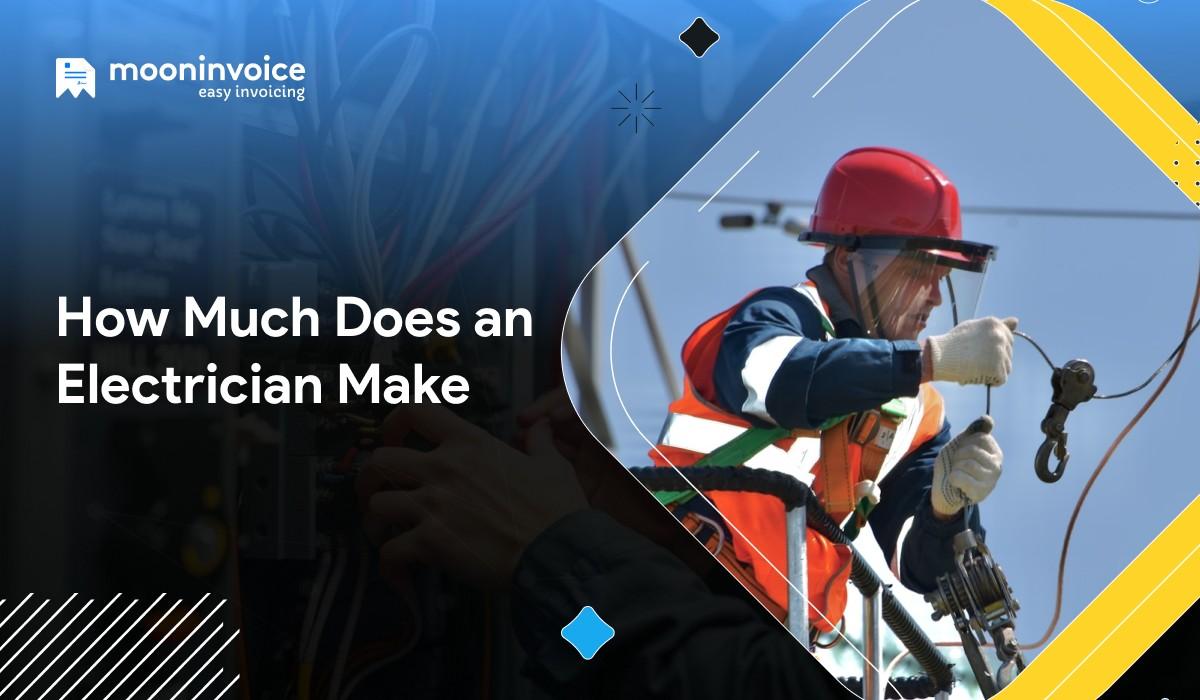Electricians are one of the most underrated professionals we come across in our daily lives. From powering homes and offices to handling complex industrial equipment, they are everywhere. Without the expertise of electricians, doing any business is next to impossible.
As of 2026, electrician jobs come with diverse opportunities, stability, and long-term growth. There are multiple factors that influence the electrician’s salary, starting from seasonal demand to market saturation.
In this blog, we will explore how much an electrician earns, how salaries vary across states, how they vary by job role, and the factors that influence an electrician’s salary.
Let’s get started!
📌 Key Takeaways
- The average annual income of electricians in the U.S. is about $62,350.
- The monthly income of electricians ranges from $3,033 to $8,156, depending on skill level and experience.
- Industrial electricians generally make more money than other electricians due to their work expertise and diverse experience.
- Some of the high-paying electrician jobs include certified electrician, electrical system designer, and electrical superintendent.
- Factors such as experience, skill, location, cost of living, and type of employer majorly impact an electrician’s salary.
How Much Do Electricians Make a Year?
According to the U.S. Bureau of Labor Statistics, in 2024, the median annual salary for electricians is $62,350, or approximately $30 per hour. These numbers are staggering, aren’t they?
Even though electricians are not headline-makers like IT professionals or real estate business owners, their earnings are still very high on average.
How Much Do Electricians Make a Month?
The average monthly income of an electrician ranges from nearly $3,033 to $8,156. For example, let’s take the average yearly income of an electrician, which is $62,350 according to the U.S. Bureau of Labor Statistics. Now, if we break this annual salary down into monthly income, it is approximately $5,195.
Now, let’s find out what the average electrician’s salary in 2026 would look like.
Tired of Estimation Processes that Waste Your Time?
Start estimating in minutes, not hours. Use Moon Invoice to create fast, professional estimates that help you close more deals and win electrical projects.
Average Electrician Salary in 2026
There are primarily three categories of electricians for which the average salary differs. Here they are:
1. Entry-Level Electrician
These electricians generally have no more than 3 years of experience, and their starting salaries hover around $35,000 to $45,000 annually.
2. Mid-Level Electrician
Electricians who have several years of experience, certifications, and full journeyman status fall into this category. The salary range of these electricians starts from $60,000 to $80,000 annually.
3. Top-Tier/ Master Electrician
These are expert electricians with a master’s licence; they can work in high-demand situations and are contractor-based. The average salary for a master electrician in the US is $74,200 annually, though it may vary depending on demand.
Emerging sectors like renewable energy and the EV ecosystem could play a large role in pushing the average electrician salary in 2026.
Electricians Salary by State
In the U.S., the location where you live has a bigger impact on how much you will earn as an electrician. States with a higher cost of living and a strong union presence offer greater potential to earn big compared to states with small markets.
Right then, how much money does an electrician make, state by state? Let’s break it down.
| State | Hourly Wage | Annual Income (Descending Order) |
|---|---|---|
Electrician Salary by Job Role and Industry
Electricians’ salaries also vary by job role and industry, not just location. Their duty, skill, and work setting indicate their pay scale.
Let’s look at the common types of electricians and how their salaries vary based on their job role and industry:
Salary by Job Role:
1. Residential Electrician
The job of residential electricians is to install, repair, and replace wiring and switches. They focus on troubleshooting household electrical problems and ensuring code compliance in single-family or small multi-unit buildings.
The average residential electrician salary in the U.S. ranges from $59,750 to $61,590 per year.
2. Commercial Electrician
The job of a commercial electrician is similar to that of a residential electrician, but in larger spaces. They install and maintain electrical systems in offices, restaurants, and larger residential complexes.
What separates commercial and residential electricians is that commercial electricians are better equipped to repair lighting systems, power distribution, fire-safety wiring, and even low-voltage systems.
Top commercial electricians in the U.S. earn as much as $64,000 a year.
3. Industrial Electrician
Industrial electricians are more efficient and reliable than commercial or residential electricians. The primary job of industrial electricians is to install, troubleshoot, and maintain high-voltage equipment, motor controls, PLCs (Programmable Logic Controller), and industrial machinery wiring.
Top industrial electricians in the U.S. earn beyond $77,500 a year. Highly experienced industrial electricians earn above $100,000 a year.
4. Maintenance Electrician
As the title suggests, “maintenance”, these electricians are experts in quick troubleshooting, repairing existing electrical systems, replacing components, and restoring power in electrical equipment. The major focus of maintenance electricians is routine inspections, preventive maintenance, and providing quick solutions.
The maintenance electrician average salary in the U.S. ranges from approximately $63,000 to $68,000 per year.
5. Construction Electrician
The job of a construction electrician is very different from that of other electricians. They prioritize working on new construction or major renovation projects that require rough-in wiring, panel installation, and large conduit runs. Their work is primarily project-driven, with start-to-finish work on large sites.
The average annual salary of a construction electrician in the U.S. ranges from $49,000 to $60,000.
Salary by Industry:
1. Solar or Renewable Energy Electrician
These electricians are different from all other types of electricians. The primary work of solar and renewable energy electricians is to design electrical systems, install PV (photovoltaic) solar arrays and microgrids, install inverters, perform performance testing, and maintain renewable installations.
The average annual salary of a solar and renewable energy electrician in the U.S. is close to $54,000.
2. Energy, Mining & Utilities
These electricians earn higher-than-average salaries due to the highly challenging environment in which they work with complex electrical systems. They work in power plants, oil rigs, or mining sites, which offer competitive pay.
The median total pay for these electricians in the U.S. is nearly $73,900.
3. Aerospace & Defense
Aerospace and defense electricians are highly skilled, as they work with advanced equipment, aircraft systems, and military-grade technology.
The average salary of an aerospace and defense electrician in the U.S. is $72,000
4. Personal Consumer Services
Electricians who offer small-scale residential services, repairs, or appliance fixes earn less than those in industrial or aerospace roles. Their income varies based on location, experience, and whether they operate independently.
Their average salary in the U.S. starts from $71,000
5. Transport & Logistics
In this industry, electricians work on airports, railways, shipping yards, etc. The pay scale for these electricians depends on their specialization, i.e., signaling systems, automation handling capability, and infrastructure maintenance.
Their average salary in the U.S. starts from $70,200.
High-Paying Electrician Jobs

There are certain electrician roles where the pay scale is higher than that of most electricians.
Let’s find out those roles:
1. High Voltage Electrician
Additional state and electrician licenses, such as apprentice, journeyman, and master electrician, along with certifications like NABCEP and PLC, showcase specialized skills, and these electricians are therefore paid higher.
The average high-voltage electrician pay scale ranges from $74,000 to $143,500.
2. Electrical Systems Designer
These electricians create layouts to power large buildings and infrastructure, which require special skills and careful attention to detail. One mistake here could destroy the entire electrical system of the building. This is why these electricians are highly rated.
Their salary ranges from $86,000 to $104,000.
3. Electrical Superintendent
The primary job of superintendents is to coordinate and quality-check every electrical system installation on residential and industrial sites.
Their salary ranges from $63,000 to $95,000.
4. Service Electrician
Service electricians are called up when problems occur. They inspect, diagnose, and repair electrical systems. In case of an emergency, they immediately identify the issue and resolve it.
Their salary ranges from $51,000 to $66,000.
What Factors Influence an Electrician’s Salary?
One can’t simply answer the question “how much does an electrician make?” — Multiple factors affect an electrician’s salary in the U.S.
Two electricians with the same job role might earn differently, depending on skill level, experience, location, industry focus, and many other factors.
Let’s understand these factors in detail.
1. Experience and Skill Level
Experience is the biggest factor that determines an electrician’s pay.
- Apprentices (training professionals) earn less and learn more.
- Journeyman electricians are mid-level, licensed electricians with experience. They earn more once they work independently.
- Master electricians are senior-level and fully experienced electricians. They handle major parts of an industry, such as inspections, supervision, or focus on operating their own business.
The more experience and better hands-on expertise, the higher your salary.
2. Location and Cost of Living
Location is another factor that can change what you earn.
In the U.S., states like New York, California, Illinois, and Washington have higher living costs and dense commercial construction compared to all other states. This is the reason why electricians who work in these states often earn more.
On the other hand, rural areas have a lower cost of living, but also lower expenses. If your spending is less, you will get a good take-home pay.
3. Type of Employer
An electrician’s salary also varies depending on who hires them. For example, large industries or commercial firms pay more than residential contractors, as the job scope is smaller in residential work settings.
Government or utility companies are reasonably good as they offer extra benefits and overtime opportunities.
Lastly, if you start an electrical business or work as a self-employed electrician, you can earn more. All you need to do is keep getting regular projects from clients, and always focus on maximizing your skills.
How Moon Invoice Helps You Manage Your Finances Smartly?
When you work as an electrician, salary is the primary concern. Similarly, after years of experience in the field, when you run an electrician business, finance is the primary concern. Your expenses, your profits, and the overall business insights all need to be checked.
To keep things organized, you should consider using a tool that handles all your finances, from expense tracking and invoice management to insights into profit margins. Moon Invoice is one such tool you can use in your business workflow.
Here’s how it helps your business:
- Quick Scan with AI: Easily convert all electrical paper documents, such as invoices, expenses, and credit notes, into digital documents with AI automation.
- Customizable Templates: Choose from over 66+ customizable invoice templates to create invoices for your electrical business.
- Expense Tracking: For each expense entry, you can attach receipts or related documents and track your business’s expenses.
- Easier Estimation: Convert estimates to invoices and track them in no time.
- Project Management: Helps you track time spent on each project and convert hours into timesheets.
What Future Holds for Electrical Business Owners?
As an electrician, your salary depends on many factors, such as the type of electrician you are, where you live, your skillset, and your employer. Currently, the future holds a great promise for electricians as the technology is advancing with each passing day. The growing demand for smart homes, EV infrastructure, and renewable energy systems is proof that the electrician job market will expand in the coming years.
If you are planning to own an electrical business that covers basic needs, you can rely on ordinary tools. But, if you are aiming for long-term growth, you should go for advanced tools like Moon Invoice to help you manage your business finances.
Check out Moon Invoice today and start your free trial now!















